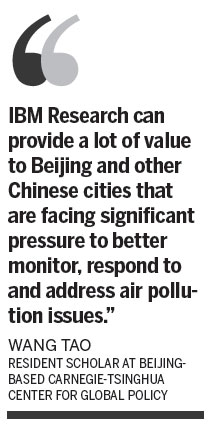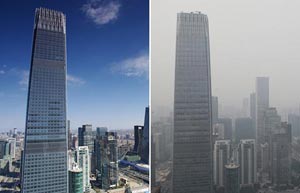IBM to help curb Beijing's pollution
By Elizabeth Wu in New York (China Daily) Updated: 2014-07-09 07:15IBM Corp announced on Monday in the United States that it had signed a contract with the Beijing municipal government to determine the basic elements of emissions to help predict air quality in the Chinese capital.
The US embassy in Beijing and China's government have been publicly reporting real-time pollution levels to local residents. The government initiates emergency measures when fine particulate matter (PM 2.5) concentrations rise too high, including regulating factory production and limiting the number of vehicles on the road. IBM said it hopes to create a tailor-made system for the region.
"By applying supercomputing processing power, scientists from IBM and the Beijing government aim to create visual maps showing the sources and dispersions of pollutants across Beijing 72 hours in advance with street-scale resolution. This capability does not exist today," Steve Tomasco, IBM Research's director of communications, wrote in an e-mail to China Daily on Monday.

IBM's cognitive computing systems will learn from streams of real-time data generated by the city's air-quality monitoring stations, meteorological satellites and IBM's new-generation optical sensors, he said.
Xiaowei Shen, director of IBM Research-China, said the system could suggest preventive measures to keep the city's air quality from approaching hazardous levels by providing data to adjust production at certain factories or to limit car traffic, as well as alert citizens about air-quality issues, he said.
"IBM Research can provide a lot of value to Beijing and other Chinese cities that are facing significant pressure to better monitor, respond to and address air pollution issues," Wang Tao, resident scholar of the energy and climate program at the Beijing-based Carnegie-Tsinghua Center for Global Policy, told the Quartz Internet news site.
But Ma Haibing, senior research associate and China program manager at the WorldWatch Institute in Washington, warned that "IBM technologies per se are definitely not the solution to China's emerging problems. IBM can only provide the very basic raw computing and modeling power of dealing with environmental challenges."
IBM's work with Beijing on air pollution is part of the company's "Green Horizon" initiative, part of which involves helping China better manage its electrical grid.
The announcement on Monday came as the company seeks to counter declining sales in China, where revenue fell 20 percent last quarter, hurt by decreasing hardware spending, Bloomberg News reported.
China is reviewing whether domestic banks' reliance on IBM's high-end servers compromises the nation's financial security, Bloomberg News reported on May 27. IBM said in May it wasn't aware of any government policy recommending against use of its servers.
 |
 |
| China to ditch dirty vehicles | Smoggy memories |
- China to accelerate treaty with US: Xi
- China's June PPI down 1.1%
- Satisfying customers, employees and society
- Climate change new engine of China, US ties
- Animal-shaped trees a cash cow for farmers
- Cabinet unveils guideline to ensure fair competition
- China's inflation grows 2.3% in June
- China's online clothing sales to reach 615b yuan

















